

Dean Ornish: Your genes are not your fate. RSA/NSPCC event - How nurture alters nature - Moshe Szyf. Who You Are is an Interactive Process. We study savants - you know, Rainman and people like that - and we think there’s obviously evidence of innate gifts because these guys are obviously born with different sorts of brains.
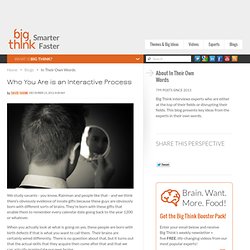
They’re born with these gifts that enable them to remember every calendar date going back to the year 1200 or whatever. When you actually look at what is going on yes, these people are born with birth defects if that is what you want to call them. Their brains are certainly wired differently. There is no question about that, but it turns out that the actual skills that they acquire then come after that and that we can actually manipulate our own brains. The word is plasticity. I'm trying to help people understand that the old notion of innate, the old notion of giftedness, the notion that we are born with a certain quantity of intelligence or a quantity of talent really isn’t there. In Their Own Words is recorded in Big Think's studio. Image courtesy of Shutterstock. Free will: just an illusion? PROSOCIAL PROGRESS: A BLUEPRINT FOR SOCIAL SUSTAINABILITY. Adversarial Journalism and The Selfish Gene.
The Y in Dobbs’ article is my book, The Selfish Gene, and his main X is the important but far from new point that genes are not always expressed in the same way.
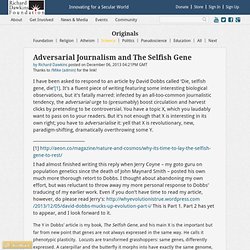
He calls it phenotypic plasticity. Locusts are transformed grasshoppers: same genes, differently expressed. A caterpillar and the butterfly it morphs into have exactly the same genome, expressed in different ways. An animal is the way it is, not just because of the genes it possesses but because the context in which a gene sits affects how – and indeed whether – it is expressed. Dobbs makes some sensible points about all this, but there’s not a single one of them that I wouldn’t be happy to make myself – and in most cases did make, either in The Selfish Gene itself or in my other books.
The Selfish Gene has a lot to say about the social insects, laying particular stress on the fact that the difference between a queen and a sterile worker is non-genetic. Why it's time to lay the selfish gene to rest – David Dobbs. A couple of years ago, at a massive conference of neuroscientists — 35,000 attendees, scores of sessions going at any given time — I wandered into a talk that I thought would be about consciousness but proved (wrong room) to be about grasshoppers and locusts.

At the front of the room, a bug-obsessed neuroscientist named Steve Rogers was describing these two creatures — one elegant, modest, and well-mannered, the other a soccer hooligan. The grasshopper, he noted, sports long legs and wings, walks low and slow, and dines discreetly in solitude. The locust scurries hurriedly and hoggishly on short, crooked legs and joins hungrily with others to form swarms that darken the sky and descend to chew the farmer’s fields bare. The Weirdest People in the World? Psychologists often joke that their insights into human nature come from experiments with American university students, on duty for required credit or beer money.
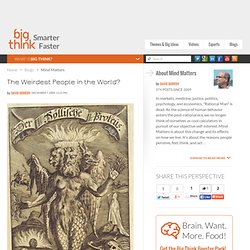
Want to Make Hunter-Gatherers Irrational? Expose Them to Free Markets. A well-known example of irrational decision-making people's tendency to overvalue the things they own (I would pay $1 for a coffee mug but will demand $5 for an identical coffee mug that happens to be mine).
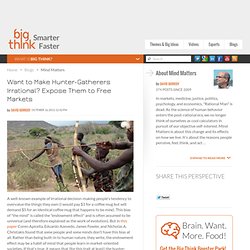
This bias of "the mind" is called the "endowment effect" and is often assumed to be universal (and therefore explained as the work of evolution). But in this paper Coren Apicella, Eduardo Azevedo, James Fowler, and Nicholas A. Christakis found that some people and some minds don't have this bias at all. Rather than being built-in to human nature, they write, the endowment effect may be a habit of mind that people learn in market-oriented societies. If that's true, it means that (for this trait at least) the hunter-gatherers described in the research were more rational before they were exposed to modern capitalism.
Apicella et al. ran their experiment on 91 Hadza Bushmen, who are among the last hunter-gatherer groups on the planet. How Poverty Taxes the Brain - Emily Badger. Human mental bandwidth is finite.
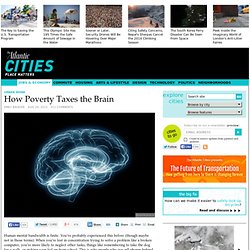
You’ve probably experienced this before (though maybe not in those terms): When you’re lost in concentration trying to solve a problem like a broken computer, you’re more likely to neglect other tasks, things like remembering to take the dog for a walk, or picking your kid up from school. This is why people who use cell phones behind the wheel actually perform worse as drivers. It’s why air traffic controllers focused on averting a mid-air collision are less likely to pay attention to other planes in the sky. Mental Illness: It's Not in Your Genes.
Even before the Human Genome Project wrapped up in April 2003, scientists have worked overtime to find the gene or genes responsible for autism, schizophrenia, Alzheimer's, ADHD, alcoholism, depression, and other ailments "known" to have major genetic components.
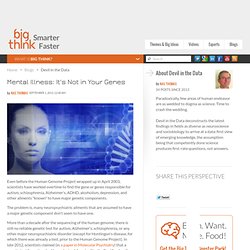
The problem is, many neuropsychiatric ailments that are assumed to have a major genetic component don't seem to have one.